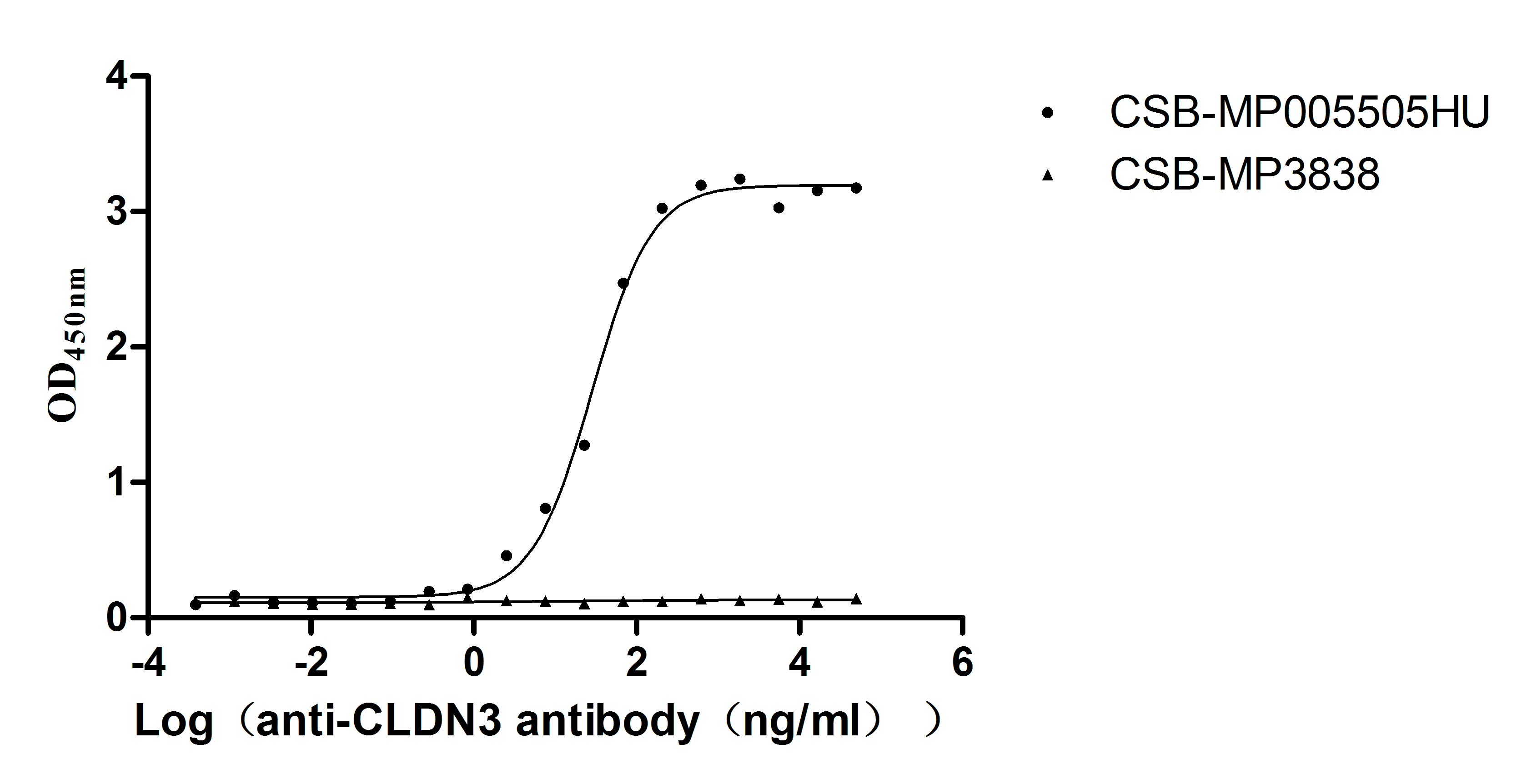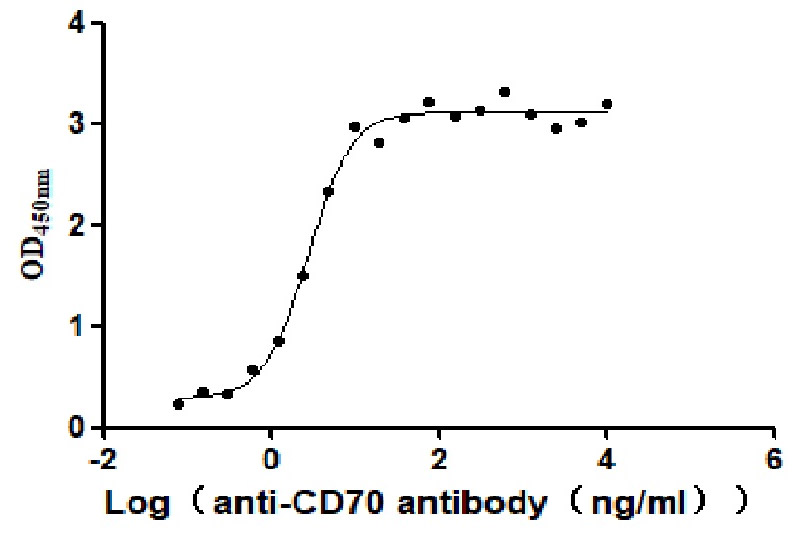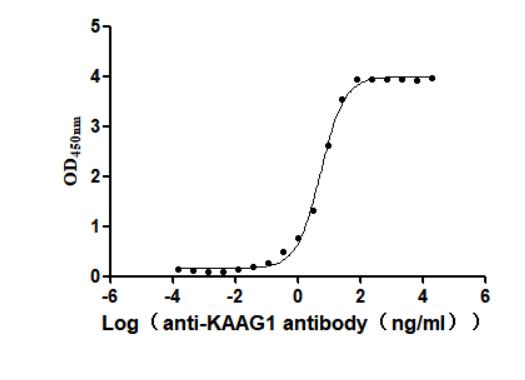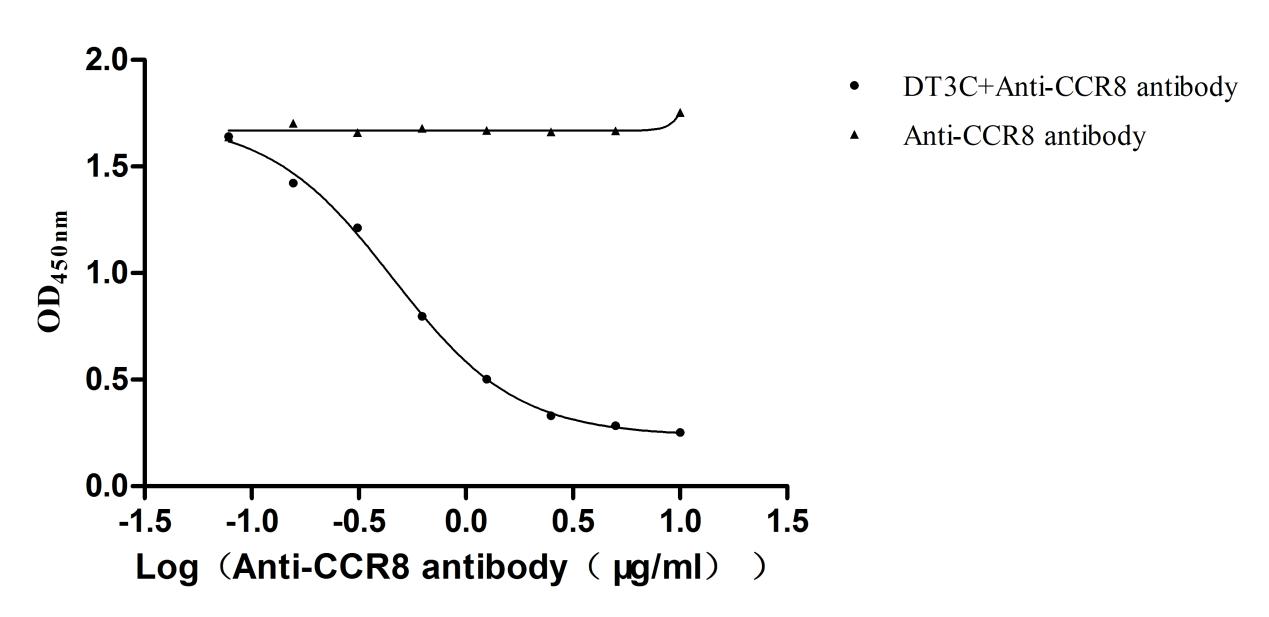Recombinant Mouse MAP kinase-activated protein kinase 2 (Mapkapk2)
-
货号:CSB-YP013473MO
-
规格:
-
来源:Yeast
-
其他:
-
货号:CSB-EP013473MO-B
-
规格:
-
来源:E.coli
-
共轭:Avi-tag Biotinylated
E. coli biotin ligase (BirA) is highly specific in covalently attaching biotin to the 15 amino acid AviTag peptide. This recombinant protein was biotinylated in vivo by AviTag-BirA technology, which method is BriA catalyzes amide linkage between the biotin and the specific lysine of the AviTag.
-
其他:
-
货号:CSB-BP013473MO
-
规格:
-
来源:Baculovirus
-
其他:
-
货号:CSB-MP013473MO
-
规格:
-
来源:Mammalian cell
-
其他:
产品详情
-
纯度:>85% (SDS-PAGE)
-
基因名:
-
Uniprot No.:
-
别名:Mapkapk2; Rps6kc1MAP kinase-activated protein kinase 2; MAPK-activated protein kinase 2; MAPKAP kinase 2; MAPKAP-K2; MAPKAPK-2; MK-2; MK2; EC 2.7.11.1
-
种属:Mus musculus (Mouse)
-
蛋白长度:Full length protein
-
表达区域:1-386
-
氨基酸序列MLSGSPGQTP PAPFPSPPPP APAQPPPPFP QFHVKSGLQI RKNAITDDYK VTSQVLGLGI NGKVLRIFDK RTQQKFALKM LQDCPKARRE VELHWRASQC PHIVHIVDVY ENLYAGRKCL LIVMECLDGG ELFSRIQDRG DQAFTEREAS EIMKSIGEAI QYLHSINIAH RDVKPENLLY TSKRPNAILK LTDFGFAKET TSHNSLTTPC YTPYYVAPEV LGPEKYDKSC DMWSLGVIMY ILLCGYPPFY SNHGLAISPG MKTRIRMGQY EFPNPEWSEV SEEVKMLIRN LLKTEPTQRM TITEFMNHPW IMQSTKVPQT PLHTSRVLKE DKERWEDVKE EMTSALATMR VDYEQIKIKK IEDASNPLLL KRRKKARAVE DAALAH
-
蛋白标签:Tag type will be determined during the manufacturing process.
The tag type will be determined during production process. If you have specified tag type, please tell us and we will develop the specified tag preferentially. -
产品提供形式:Lyophilized powder
Note: We will preferentially ship the format that we have in stock, however, if you have any special requirement for the format, please remark your requirement when placing the order, we will prepare according to your demand. -
复溶:We recommend that this vial be briefly centrifuged prior to opening to bring the contents to the bottom. Please reconstitute protein in deionized sterile water to a concentration of 0.1-1.0 mg/mL.We recommend to add 5-50% of glycerol (final concentration) and aliquot for long-term storage at -20℃/-80℃. Our default final concentration of glycerol is 50%. Customers could use it as reference.
-
储存条件:Store at -20°C/-80°C upon receipt, aliquoting is necessary for mutiple use. Avoid repeated freeze-thaw cycles.
-
保质期:The shelf life is related to many factors, storage state, buffer ingredients, storage temperature and the stability of the protein itself.
Generally, the shelf life of liquid form is 6 months at -20°C/-80°C. The shelf life of lyophilized form is 12 months at -20°C/-80°C. -
货期:Delivery time may differ from different purchasing way or location, please kindly consult your local distributors for specific delivery time.Note: All of our proteins are default shipped with normal blue ice packs, if you request to ship with dry ice, please communicate with us in advance and extra fees will be charged.
-
注意事项:Repeated freezing and thawing is not recommended. Store working aliquots at 4°C for up to one week.
-
Datasheet :Please contact us to get it.
相关产品
靶点详情
-
功能:Stress-activated serine/threonine-protein kinase involved in cytokine production, endocytosis, reorganization of the cytoskeleton, cell migration, cell cycle control, chromatin remodeling, DNA damage response and transcriptional regulation. Following stress, it is phosphorylated and activated by MAP kinase p38-alpha/MAPK14, leading to phosphorylation of substrates. Phosphorylates serine in the peptide sequence, Hyd-X-R-X(2)-S, where Hyd is a large hydrophobic residue. Phosphorylates ALOX5, CDC25B, CDC25C, CEP131, ELAVL1, HNRNPA0, HSP27/HSPB1, KRT18, KRT20, LIMK1, LSP1, PABPC1, PARN, PDE4A, RCSD1, RPS6KA3, TAB3 and TTP/ZFP36. Phosphorylates HSF1; leading to the interaction with HSP90 proteins and inhibiting HSF1 homotrimerization, DNA-binding and transactivation activities. Mediates phosphorylation of HSP27/HSPB1 in response to stress, leading to dissociation of HSP27/HSPB1 from large small heat-shock protein (sHsps) oligomers and impairment of their chaperone activities and ability to protect against oxidative stress effectively. Involved in inflammatory response by regulating tumor necrosis factor (TNF) and IL6 production post-transcriptionally: acts by phosphorylating AU-rich elements (AREs)-binding proteins ELAVL1, HNRNPA0, PABPC1 and TTP/ZFP36, leading to regulation of the stability and translation of TNF and IL6 mRNAs. Phosphorylation of TTP/ZFP36, a major post-transcriptional regulator of TNF, promotes its binding to 14-3-3 proteins and reduces its ARE mRNA affinity leading to inhibition of dependent degradation of ARE-containing transcripts. Phosphorylates CEP131 in response to cellular stress following ultraviolet irradiation which promotes binding of CEP131 to 14-3-3 proteins and inhibits formation of novel centriolar satellites. Also involved in late G2/M checkpoint following DNA damage through a process of post-transcriptional mRNA stabilization: following DNA damage, relocalizes from nucleus to cytoplasm and phosphorylates HNRNPA0 and PARN, leading to stabilization of GADD45A mRNA. Involved in toll-like receptor signaling pathway (TLR) in dendritic cells: required for acute TLR-induced macropinocytosis by phosphorylating and activating RPS6KA3.
-
基因功能参考文献:
- The importance of MK2 in driving proinflammatory cytokine production, its relevance to in vivo tumor proliferation and invasion. PMID: 29197088
- MK2 promotes polarization of tumor-associated macrophages into protumorigenic, proangiogenic M2-like macrophages. PMID: 29666270
- Phosphorylation of inhibitory PAS domain protein (IPAS) at Ser184 by MAPK-activated protein kinase 2 (MK2 or MAPKAPK2) enhances the proapoptotic function of IPAS. PMID: 29054108
- MK2-mediated RIPK1 phosphorylation is an important molecular mechanism limiting the sensitivity of the cells to the cytotoxic effects of TNF. PMID: 28920952
- p38MAPK/MK2 phosphorylation of RIPK1 is a crucial checkpoint for cell fate in inflammation and infection that determines the outcome of bacteria-host cell interaction. PMID: 28920954
- MK2-mediated phosphorylation of RIPK1 serves as a checkpoint within the TNF signaling pathway that integrates cell survival and cytokine production. PMID: 28506461
- this study shows that the loss of MK2 in mast cells decreases the IL-33-induced leukocyte recruitment and the resulting skin inflammation PMID: 27694493
- MK2 signaling differentially regulated CCL3 and CCL4. PMID: 27795356
- MK2-activating peptide (MK2-AP) blocks the effects of anthrax lethal toxin on endothelial barriers in cultured cells and reduces pulmonary vascular leak in rats. PMID: 26066827
- MK2 regulates postnatal arteriogenesis by controlling vascular recruitment of monocytes/macrophages in dual manner: regulation of endothelial MCP-1 expression in response to hemodynamic and inflammatory forces as well as MCP-1 dependent monocyte migration PMID: 26431421
- these data suggest there is a sexual dimorphism in MK2 signaling of osteoclast progenitor cell subpopulations. PMID: 25946081
- Loss of MK2 effectively blocks bone resorption and prevents the development of postmenopausal bone loss. PMID: 23169443
- This study showed that cmpd28, a Mapkapk2/3 inhibitor, represents a potentially new approach to type 2 diabetes therapy. PMID: 26068544
- Deficiency of MK2 prevents adverse remodelling and promotes endothelial healing of the arterial wall after injury. PMID: 25120198
- high-fat diet-fed MK2-/- mice display decreased glucose tolerance and increased insulin resistance compared to controls. Decreased adipose tissue expression of GLUT4 might contribute to this phenotype. PMID: 25233471
- Show a low dose of tumor necrosis factor (TNF) causes hyperacute mortality via an oxidative stress driven mechanism in MK2-deficient mice. In addition, MK2-deficient mice were found to be more sensitive to cecal ligation and puncture-induced sepsis. PMID: 25185746
- a key role of MK2 and FasR in the regulation and limitation of the immune response in the CNS PMID: 24964076
- These data suggest that MK2 is a key downstream effector of p38 that can modulate pemphigus vulgaris autoantibody pathogenicity. PMID: 23657501
- Ube2j1 is phosphorylated in response to lipopolysaccharides in macrophages and contributes to MK2-dependent TNFalpha biosynthesis by an unknown mechanism. PMID: 24020373
- MK2 mediated the cellular inflammatory responses within the intestinal muscularis in a mouse model of postoperative ileus. PMID: 23764316
- MK2 activity was required for damage response, accumulation of ssDNA, and decreased survival when cells were treated with the nucleoside analogue gemcitabine or when the checkpoint kinase Chk1 was antagonized. PMID: 24082115
- MAPKAPK-2 regulates SERCA2a expression and fiber type composition to modulate skeletal muscle and cardiomyocyte function. PMID: 23608535
- Protein kinases MK2 and MK3 play critical roles in a mouse model of glomerulonephritis. PMID: 23372691
- activation of PP2A or inactivation of the p38MAPK-MAPKAPK2-Hsp27 has a role in survival of cancer stem cells under hypoxia and serum depletion via decrease in PP2A activity PMID: 23185379
- MAPK-activated protein kinase-2 limits endothelial inflammation via the PIAS1 S522 phosphorylation-mediated increase in PIAS1 transrepression and SUMO ligase activity. PMID: 23202365
- Report a novel CB(2)-activated and MK2-dependent pathway that modulates cytokine expression and reduces pancreatic injury and affiliated complications in cerulein-induced pancreatitis. PMID: 23139224
- There is an important role for p38 MAPK/MK-2 signaling in podocyte injury. PMID: 21613416
- MK2 regulates LPS-induced IFNbeta expression and downstream STAT3 activation as it restrains MK3 from mediating negative regulatory effects PMID: 21586572
- This study showed that long PDE4 isoforms provide a novel node for cross-talk between the cAMP and p38 MAPK signalling systems at the level of MK2. PMID: 21323643
- Data show that MK2 plays a critical role in angiotensin II signaling, leading to hypertension, oxidative stress via activation of p47phox and inhibition of antioxidants, and vascular inflammation and proliferation. PMID: 21173344
- p38 MAP kinase and MAPKAP kinases MK2/3 cooperatively phosphorylate epithelial keratins. PMID: 20724476
- lack of MK2 can reduce tissue damage after spinal cord injury and improve locomotor recovery. PMID: 20943915
- Data show that nuclear export of p38 requires its dephosphorylation, and it is exported in a MK2-dependent manner. PMID: 20506250
- MK2 phosphorylation reduces the ability of TTP to promote deadenylation by inhibiting the recruitment of CAF1 deadenylase in a mechanism that does not involve sequestration of TTP by 14-3-3. PMID: 20595389
- data suggest that MK2 may be essential for functional meiotic bipolar spindle formation, chromosome segregation and proper kinetochore-microtubule attachments PMID: 20596525
- MK2 participates in the multifactorial regulation of early inflammatory responses in acute pancreatitis, independently of the regulation of stress proteins like HSP25 and HSP60 and most likely due to its effect on cytokine regulation. PMID: 20501446
- MK2 has an important role in mediating some aspects of p38-induced cardiac hypertrophy/heart failure. Demonstrate a role for MK2 in the regulation of COX-2 protein expression. PMID: 20339119
- critical role for mapkapk2 gene expression in macrophages participating in the process of cutaneous wound healing PMID: 19609314
- MAPKAP kinase 2 phosphorylates tristetraprolin on in vivo sites including Ser178 PMID: 14688255
- MAPKAPK2 has a role in the uropod localization of PTEN during FMLP-induced neutrophil chemotaxis PMID: 15033451
- MK2, similar to p38mitogen-activated protein kinase, is involved in transmitting the death signal to the ischemic myocardium PMID: 15623425
- Mouse cells deficient for MK2 show reduced Mdm2 phosphorylation and elevated levels of p53 protein. PMID: 15688025
- In MC3T3 E1 and newborn mouse calvarial osteoblastic cultures the OGP-(10-14) mitogenic signaling is critically dependent on de novo synthesis of mitogen-activated protein kinase-activated protein kinase 2 (Mapkapk2) mRNA and protein. PMID: 16150701
- Deletion of the MK2 gene in DBA/1LacJ mice confers protection against collagen-induced arthritis. The MK2 heterozygous mutants display an intermediate level of protection when compared with homozygous mutant and wild-type littermates. PMID: 16849504
- S28463 and CpG DNA-induced MK2 signalling regulates TNF mRNA primarily at the translational level, whereas lipopolysaccharides-induced MK2 signalling regulates both the stability and translational efficiency of TNF mRNA. PMID: 17485113
- Appears to mediate myofibroblast differentiation; inhibiting that differentiation might contribute to fibrosis rather than protect against it. PMID: 17600313
- MK2 does not directly participate in neuronal cell death, but indirectly contributes to neurodegeneration by the production of neurotoxic substances, such as nitric oxide or tumor necrosis factor alpha, from activated glia cells. PMID: 18298661
- Data suggest a possible role of mitogen-activated protein kinase-activated protein kinase (MK)2 in the cellular response after neuronal depolarization, in particular in excitotoxicity. PMID: 18702688
- p38 MAPK-induced myocardial ischemic injury is not modulated by MK2. PMID: 19214782
- Thus, MK2 emerges as a regulator of haematopoietic stem cell homeostasis, which could act through chromatin remodelling by the PcG complex. PMID: 19369945
显示更多
收起更多
-
亚细胞定位:Cytoplasm. Nucleus. Note=Phosphorylation and subsequent activation releases the autoinhibitory helix, resulting in the export from the nucleus into the cytoplasm.
-
蛋白家族:Protein kinase superfamily, CAMK Ser/Thr protein kinase family
-
组织特异性:Ubiquitously expressed (at protein level).
-
数据库链接:
KEGG: mmu:17164
STRING: 10090.ENSMUSP00000016672
UniGene: Mm.221235
Most popular with customers
-
Recombinant Human Insulin growth factor-like family member 1 (IGFL1) (Active)
Express system: Mammalian cell
Species: Homo sapiens (Human)
-
Recombinant Human R-spondin-1 (RSPO1), partial (Active)
Express system: Mammalian cell
Species: Homo sapiens (Human)
-
Recombinant Human C-X-C chemokine receptor type 4 (CXCR4)-VLPs (Active)
Express system: Mammalian cell
Species: Homo sapiens (Human)
-
Recombinant Human Claudin-3 (CLDN3)-VLPs (Active)
Express system: Mammalian cell
Species: Homo sapiens (Human)
-
Recombinant Human CD70 antigen (CD70), partial (Active)
Express system: Mammalian cell
Species: Homo sapiens (Human)
-
Recombinant Human Kidney-associated antigen 1(KAAG1) (Active)
Express system: Baculovirus
Species: Homo sapiens (Human)
-
Recombinant DT3C (Diphtheria toxin & spg 3C domain) for Antibody Internalization Assay (Active)
Express system: E.coli
Species: N/A


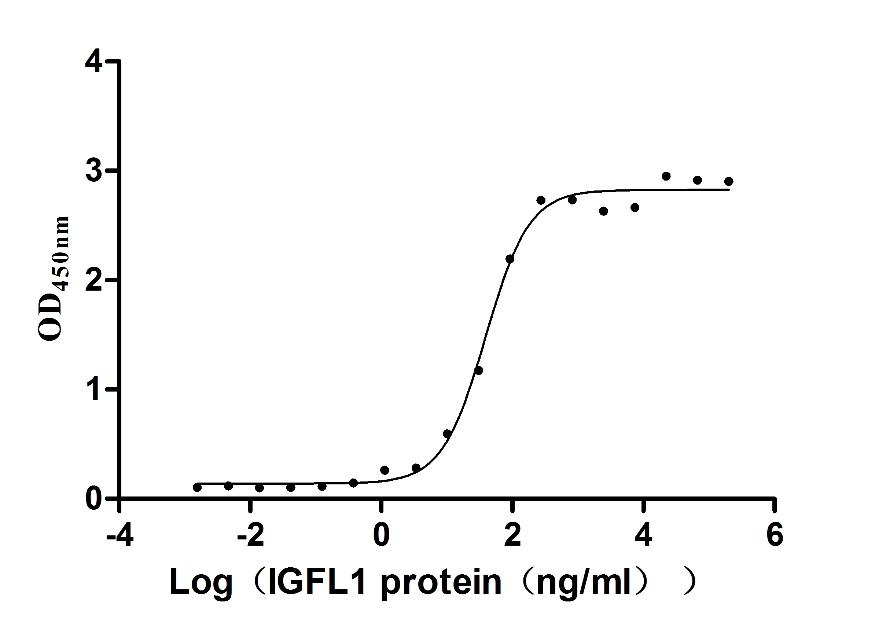
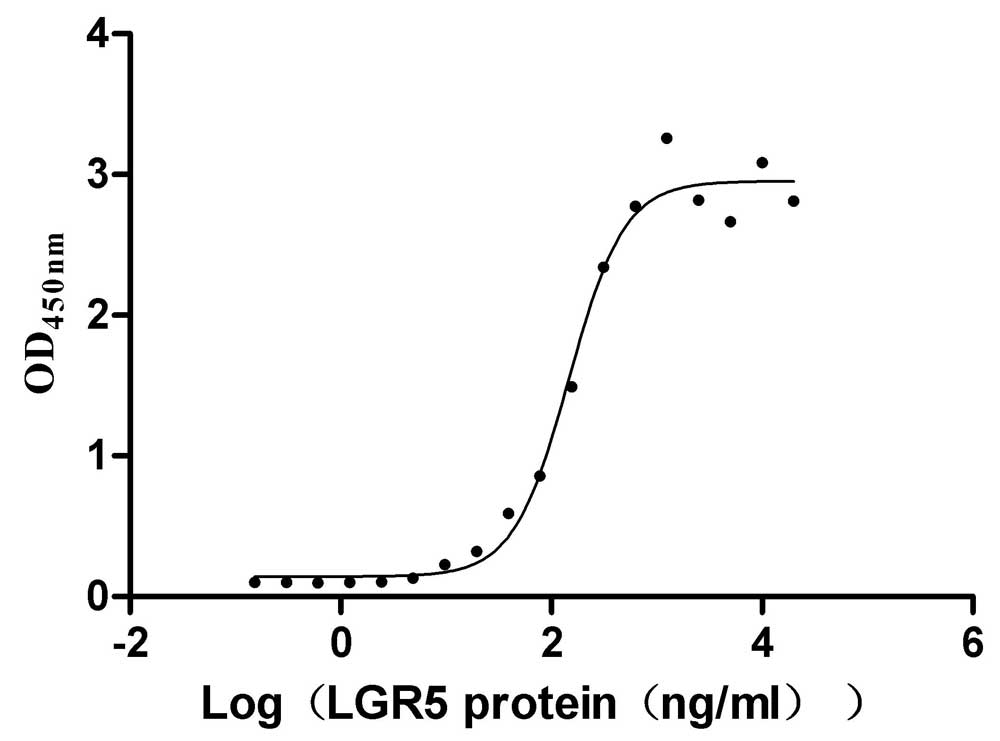
-AC1.jpg)
